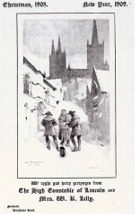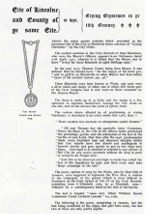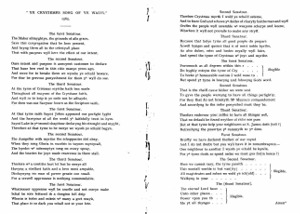The History of Lincoln Waites
1564 - 1565
The Lincoln Ceremony of Crying Christmas
The words of "Crying Christmas" were written on a flyleaf of "Entries of the Common Council [of Lincoln] (1565 - 1599)" (ref: L1/1/1/3). This page of verse can be found just before the first list of Mayor's Officers for the year 1564/1565.
The words are written in a contemporary hand. The leaf is headed, "Anno xxv. Officij Willelmi Hynde Communis Clerici Civitatis Lincolniensis". It is likely that the words of "Crying Christmas" were written there by the Official Recorder, William Hynde, but it may also be possible that they were written there by someone else. The fact that these words appear in this particular document, suggest Civic (Mayoral) Sponsorship of the Christmas Festivities in the City.
Historians cannot agree whether these verses were spoken or sung. The words of "Crying Christmas" are clearly meant to be delivered by three characters. We know that these were three of the Mayor's Officers because there is a further note in 1571 recording that their robes for Crying Christmas were to be renewed at Civic expense. The urge to supposition, would lead me to wonder whether the three Senatours (Wise Men?) might have been played by the three City Waites, who were certainly appointed by the Mayor/Common Council and who were provided livery coats out of public funds.
Crying Christmas
1. The First Senatour
- The maker Allmyghtye the grounds of all grace
- Save this Congregation that here be present
- and Bryng them all to the Celestyall place
- That with paycens wyll here the effect of our intent
2. The Second Senatour
- Oure intent & purpose is Auncyent customes to declare
- that have ben Vsed in this Citie manye yeres ago
- and noew for to breake them we wysshe ye schuld beware
- for ther be grevous ponysshmentes for them that wyll do soo
3. The Third Senatour
- At the tyme of Crystmas, mythe haith ben made
- throughout all nacyons, of the Crystian faith
- and styll so to keip it, ye nede not be affrayde
- for then, was our Savyour bourn as the Scripture saith
4. The First Senatour
- At that tyme saith Saynt John, appeared our perfight lyght
- and the Saveyour of all the world that faithfully trust in hym.
- Saynt Luke in ye second Chapitour declaryng his strenght and myght
- therfore at that tyme, to be merye we wyssh ye schuld begyn.
5. The Second Senatour
- The Aungelles with myrthe, the Scheperdes did obey
- when they Song, gloria in excelsis, in tuynes mystycall
- The byrdes with Solempnytye Song on every Spray
- And the beastes for joye, made reverence in there stall
6. The Third Senatour
- Therfore with a contrite hart, let hus be merye all
- having a stedfast faith, & a Love most, amyable
- disdaynyng no man of power greate nor Small
- for a crewell oppressour, is nothyng commendable
7. The First Senatour
- Whatsoever a oppressor wyll be cruell & not merye make
- schal be sore fettered in a dongion full deip
- wherein in todes & nuiteis with many a gret Snayk
- that place is so dark you schall not se your feite
8. The Second Senatour
- Therefore Chrystmas myrthe I wold you schuld esteme
- and to feare god & schewe ye deides of Charytye, boith man & wyff
- orelles the people wyll assemble with weapons scherpe & keene
- wherfore it wyll not prevaille to make any Stryff
9. The Third Senatour
- aganst that holye tyme, all good people do prepare
- aswell kynges & Quenes that is of most noble byrth
- as also dukes erles & lordes Royally wyll faire
- and Spend the tyme of Chrystmas with Joye & myrthe
10. The First Senatour
- Forsomuch as all degrees within this realm
- do highly esteym the tyme of Crystmas
- to breake that honerable custom I wold none to
- but Spend ye tyme in hearyng & folowyng godes(word)
11. The Second Senatour
- That is the Cheiff cause hither we were sent
- to gyve the people warnyng to have all thynges perfightly
- For they that do not, breaketh Mr Mayours Comaundement
- and accordyng to the order, ponysshed must they be
12. The Third Senatour
- Therfore endevour your selffes to have all thynges well
- that no default be found neither of Riche nor pore
- but at that tyme help your neighbures as St James doth tell
- Refresshyng the povertye that cometh to yor dore
13. The First Senatour
- Breiffly we have declared, theffect of our mynd
- and I do not doubt but you wyll have it in rememberance
- one neighbour, to an other, I wyssh ye schuld be kynde
- for ye tyme doith so Spend nedes we must goo from hence
14. The Second Senatour
- here we cannot tarye the tyme passith away
- this mortall world is but vanitye
- all magistrates & Rulers we wold ye schuld obey
- walking in your va***
15. The Third Senatour
- The eternall Lord, hav***
- vnto other place***
- powerVpon you th***
- he,that all thynges***
*** indicates that these lines in the manuscript are incomplete
The reason that some lines of verse are completely missing is that this volume of minutes sustained considerable water damage at some point when it was stored at the Guildhall. Water has discoloured the edge of most pages. The page bearing the words of "Crying Christmas" is quite severely damaged and parts of the edge are completely missing - yet it does not appear to have been torn. It seems to me, more as if the edge of the paper has dissolved.
I am grateful to Chris Gutteridge, for painstakingly reconstructing the 14th and 15th verse for the Waits of Lincoln. As so much of the 15th verse is missing, he does not claim that his version is exactly as the original would have been, but rather a good working alternative. He has tried to keep the pattern, scansion and form as close to the other verses as possible. The "Vale of Tears" is a Biblical reference which echoes Psalm 83 from The Latin Vulgate (which is numbered as Psalm 84 in the King James Translastion of the Bible) and the Salve Regina (a prayer to St. Mary). A study of the York "Yule-Girthol" suggests that the last verse would be a blessing. The change in rhyming pattern of the last verse is a technique employed by Elizabethan poets to suggest finalisation.
14. The Second Senatour
- here we cannot tarye the tyme passith away
- this mortall world is but vanitye
- all magistrates & Rulers we wold ye schuld obey
- walking in your vale of tears so haplessly
15. The Third Senatour
- The eternall Lord, have mercy on your souls this day.
- vnto other place to bear our tidings we must now away
- powerVpon you that ye may do good, the Lord bestow
- he,that all thynges both good and evil doth well know.
1480
The official Chistmas card, sent by the High Constable of Lincoln, in 1908, quotes unreferenced offical sources, claiming that the custom of Crying Christmas was described as early as 1480. The quote seems to suggest that the Mayor and the Constables would more or less turn a blind eye to any general misconduct - due to the excitement [and increased alcohol consumption] during the 12 days [holiday] of Christmas: "Evere franchest man and dennyssen inhabite within this Citie schalle have free liberte and sayffegarde in honest mirthe and gam sportis to goo or doe what hym pleys". The source goes further by promising that [during the 12 days of Christmas] no man will be attacked or arrested by any officers of this City without a writ from the King himself!
1572
"The old robes which the Officers Cried Christmas withal to be made into decent cloaks for the said officers to cry the same yearly."
1576
"Christmas myrthe to be proclaimed in ten or twelve places and every Alderman to ride with the Officers".
15 November 1677
"Ordered Alfo that the Maiors old Cry or Proclamation of this Citty shall be proclaimed tomorrow (being ffryday) betweene the houres of tenne and twelve in the forenoone and it is therefore defired that all the Aldermen and the rest of the Coman Counfell of this Citty doe attend on Mr Maior in their gowns for the proclaiming of the same." (L1/1/1/6, page 288)
The Recorder does not specify what Proclamation he is referring to - as if it needs no explanation - the Council members obviously know exactly what is being discussed. This use of 'shared meanings' is common in the old minutes books. It was mid-November - could he mean the Procalmation of Crying Christmas?
1908
The official Christmas card sent by the High Constable of Lincoln in December 1908 contains a great deal of text as well as the usual picture, or perhaps a not so usual picture, it depicts three shadowy figures - musicians it seems, one blowing what could be an oboe or a shawm - these are Lincoln City Waites, no less.

- View larger versions of this image:
-
JPG document
 PDF document
PDF document

It is quite likely that the picture was painted especially for this card, if this is the case, A. G. Webster's picture dates from the early 20th century too (Victorian/Edwardian). The Lincoln Collection holds almost 150 paintings by A.G. Webster at the Usher Art Gallery in Lincoln. It is rare to find any people in Websters many paintings of Lincoln Buildings. indeed, this card may be a one-off.
This romantic vision of the City Waits playing outside of the Jews House, with Lincoln Cathedral in the background, is reminiscent of later Christmas cards depicting carol singers in similar picturesque locations. This particular depiction shows the Cathedral complete with wooden spires. Although Lincoln Cathedral did once (sometime after 1311) have a central lead-encased wooden spire atop its central tower. The cathedral once had three wooden spires. The central spire blew down in a storm in 1549. Those on the two western towers were removed in 1808 for being unsafe.

- View a larger version of this image:
-
JPG document
 PDF document
PDF document

The text explains the "quaint" custom which prevailed in the municipal life of the City in Medieval times, called "Crying Christmas".

- View a larger version of this image:
-
JPG document
 PDF document
PDF document








